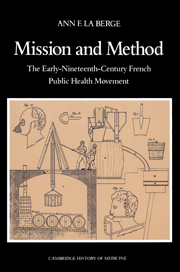Book contents
Epilogue
Published online by Cambridge University Press: 17 September 2009
Summary
Hygienists writing in the 1850s considered the science of public hygiene mature. In the decades after 1848 public hygiene came of age both as a scientific discipline and in terms of practical results. According to Adolphe Trébuchet, the Paris health council and the society of the Annales d'hygiène publique et de médecine légale established the science of public hygiene on a firm basis and made possible its propagation both in France and abroad. In terms of practical results, reforms that were advocated in the first half of the century were effected in some cities with the urban transformations of the Second Empire. Paris and Lyon, where water supplies and sewerage systems were enlarged and improved, are obvious examples. After 1850 some of the problems that had preoccupied early-nineteenth-century hygienists were solved by industrial improvements and chemical discoveries. But new ones appeared, such as health concerns related to railway hygiene. Subsequent to the public health law of 1848, health councils proliferated throughout the nation. And in 1854, the editors of the, Annales d'hygiène publique commenced the second series of the journal, with a commitment to continue to publicize all aspects of public health and legal medicine, as they had done in the first series (1829–54).
The work of the leading hygienists, such as Jean-Baptiste Monfalcon and A. P. Isidore de Polinière, Alexandre Parent-Duchâtelet, Alphonse Chevallier, Michel Lévy, and Louis-René Villermé, continued to be widely cited and in most cases remained the definitive studies on the subjects they had treated.
- Type
- Chapter
- Information
- Mission and MethodThe Early Nineteenth-Century French Public Health Movement, pp. 320 - 326Publisher: Cambridge University PressPrint publication year: 1992

